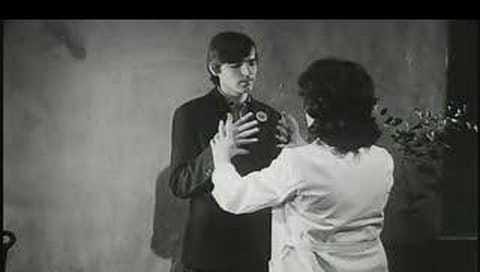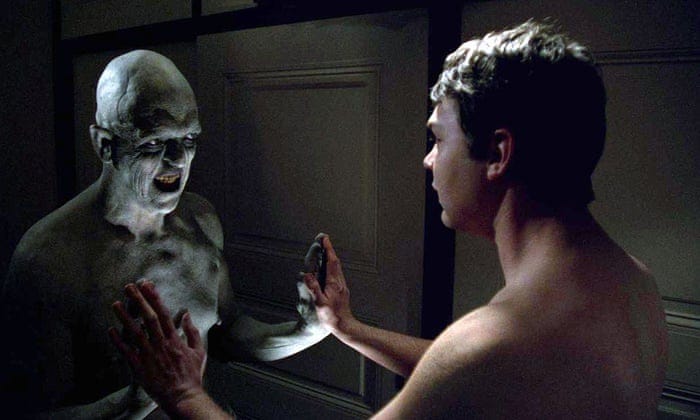We apologize that Jitterbug Drag dancing lessons will be held without live accompaniment. There is no band. No orchistruss accompaniment.
[Band Plays Things Have Changed]
No. Hay. Banda.
Our first feature concerns a mental deficient not unlike your programmers, urged to kill and kill and kill until there’s nothing left to remember by a more articulate self no longer stuttering from THE OTHER SIDE OF THE MIRROR. Like many films that don’t competently adhere to the language of cinema, THE EVIL WITHIN is a form of acquired communication possessed of a staccato profundity and jarring INCOHERENCE.
Oil heir Andrew Getty spent the fifteen years preceding his unseemly death making this keelless Cassowary. To dramatize the demons that whispered into his Wernicke’s, Getty smoked meth; colour corrected the DALL-Es, something which is simply not done; collected Zeus Electrosex Urethral Sounds; created in-camera effects inconceivable by amateur standards; kept on payroll Michael Berryman, who suffers from outward symptoms of hypohidrotic ectodermal dysplasia, meaning he has no sweat glands, hair or teeth; wrote THE ROOM-tier dialog and then rewrote it; consulted with story editors; hired dozens of drivers, grips, best boys—all to make his vision polished as possible because according to producer Ryan Readenour: “When he was young he would have these really powerful, sick, twisted dreams, and [they were] so shocking to him that he didn't think they came from him.”
Uncertain whether demons can even be exorcised or merely innervated in these templexitous times, we commend any dope fiend daring to confront the genital mutilations committed in the oneiric ANTICHRIST state, no delusions about what was great. Tarkovsky, a more accomplished filmmaker with a similar preoccupation, distinguished THE LIMITS OF CONTROL we have In Dreams, “In one of them, the dreamer controls the action: He controls what happens and what will happen: He is a demiurge. In the other, he is incapable of getting control and becomes the victim of violence, against which he cannot defend himself. It all results in pain and anxiety.”
Getty was concerned with dreams where he controlled the action and was the perpetrator of violence. THE GUILTY can accept that evil awaits them. That most insane banality of “I’ll see you in hell” exists because evil outcomes strike accuser and accused as a fitting end to our meanness. What we can not so easily move beyond is if we are the demiurge of our own descent. That we are self-sacrificing ourselves to THE EVIL WITHIN. In a video essay both Rebeca and MacLeod have told my YouTube account I am not interested in after repeated dawntide reprisals, YouTuber In Praise of Shadows asks, “When we dream of horrific things, is that then a reflection of who we are, or what we want, or desire?”
What, then, of THE EVIL WITHIN and the evil without’s Manichean mother side: the RADIO DAYS dream set around the Canada Day KFC bucket, turnips passed with tender laughter. Or the dream Jung describes of rescuing a bored damsel from a dreary home life, prompting the question, “To what nonsense am I damned? Is it my soul that harbors such novelistic brilliance? Must this, too, happen to me? I am truly in Hell—the worst awakening after death, to be resurrected in a lending library!” causing one to wonder, “banality within or banality without?” Are these, too, a reflection of who we are, what we want, or desire, or are they messages from an outsideness?
[T]here may be some other faculty [of my mind] not yet fully known to me, which produces these ideas without any assistance from external things; this is, after all, just how I have always thought ideas are produced in me when I am dreaming.[1]
What if you’d just awakened on stage like me to realize there is no band? As Roberta Sparrow writes in The Philosophy of Time Travel, “When the Manipulated awaken from their Journey into the Tangent Universe, they are often haunted by the experience in their dreams. Many of them will not remember.”
[Band Plays Accidently, Like A Martyr]
Yes, Time Out of Mind again after a Rude Awakening, Diane Selwyn is manipulating the dead in digitelegiac sofa reveries of an analog love that’s Going Going Gone. As the dreamer she simultaneously creates and views the film. The dream-mind creates the tripartite structure, the Billy Ray Cyrus sub-plot, the jokes that bite us real bad, the singers singing I’ve Told Every Little Star.
Rotten Tomatoes summarizes, “David Lynch's dreamlike and mysterious Mulholland Drive [a]s a twisty neo-noir with an unconventional structure that features a mesmerizing performance from Naomi Watts as a woman on the dark fringes of Hollywood.”
We’d like to address the dreamlike quality of the films within this film, the dreams within this film, the films within Diane’s dream, the film-like quality of Diane’s dream itself, the dream-like quality of Lynch’s film proper.
In a French DVD release, Lynch asked ten questions of viewers including, “Where is Aunt Ruth?” and “Who Gives a Key and Why?” Having heard that, “Riddling commences by questioning” but “[n]ot everyone has a right to every question”[2] we have the temerity to ask the following:
How often in WAKING LIFE have you heard spoken an in-dream clue obvious as, “I just came here from Deep River, Ontario and now I’m in this dream place and you can imagine how I feel.”
Is it all recorded? Is it all a tape? We mean this, right now. Is it all recorded?
Any 8k Call of Duty: Modern Warfare types ever lower the film grain setting to remind yourself that you’re in a game and not a film?
What, then, of augmented reality?
What of sacred games when “there is no virtual which does not become actual in relation to the actual, the latter becoming virtual through the same relation: it is a place and its obverse which are totally reversible.”[3]
What are the ethical implications of informing statuary present on tonight’s plane we’ve Dunne dreamt them as mere manifestation?
Why do dreams so often have that sitcom feel before they turn terrifying?
How do RABBITS appear when Faust asleep?
Who are the others audience members assembled at Club Silencio? What other audience members are assembled here tonight, other than your own percipient individual ego?
Is some baseline creativity a prerequisite to dreaming a film dream more conversant in cinematic language than THE EVIL WITHIN, or is the very language of film an externality that dreamed itself onto film reels still stored on cores in extracausious dread of the looming digital demise of creative integrity?
Martha P. Nochimson writes in Film Quarterly.
Mulholland Drive propels the audience through a set of disorienting transformations in order to follow the life of creative integrity to its demise, an issue of life and death importance to David Lynch. Such an extinction is not, according to this film, a single event, but the devastation of the web of interconnection that supports a secure reality; an onslaught against the very stability on which time and space depends. There are cosmic implications.
The first such cosmic implication is Diane Selwyn’s “perfect mystery” of love; the second cosmist dilatation is the digital-vaginal dread informing these dreams. This section consists of two frames, creating what Lynch calls, “a tripartite structure.” In An Oneiric Fugue: The Various Logics of Mulholland Drive, David Andrews reminds viewers that the terrifying bum from Diane’s dream, the one that scares Patrick Fischler to death behind the Winkie’s, continues to exist even after Diane has woken up, and lo, even after Diane has died. “If the bum is actual he may actually be ‘doing it,’ that is dictating her dream and pushing her closer to the abyss after she wakes up.”
Andrews’ interpretation gives credence to Andrew Getty’s hope that what he dreamt as a child may actually be the handiwork of external malevolence(s), the cosmic implication of which might just justify fifteen years spent on a non-conversant film to implicate Getty’s own whispering ANTICHRIST. WHAT FOLLOWS is the causal question: did the external malevolence(s) attracted to Andrew Getty addict him to amphetamines and rot his ulcers because he dared address THE EVIL WITHIN, or did he make THE EVIL WITHIN because the talking in his sleep foretold of malevolent agency over him?
If “emblems of guilt” are not inherent to us but may be “baleful external factors,”[4] like the jump scare terror bum scaring Patrick Fischler like he “can’t tell you” as he embodies the fall to harm found in the face of Regina Kay Walters, is this secondary frame exonerative of Diane, Andrew Getty’s protagonal mind murderer, and all we deluded dreamers enabling giga-death by sleeping on the ringing belles de guerre; is Andrews reading of MULHOLLAND DRIVE as “a film that allows the possibility that the unconscious is a conduit to some legitimate alternative reality or that ontological alternatives of some sort exist” not a call to cinematic arms?
[1] Rene Descartes, A Discourse on the Method
[2] Heidegger, Nietzsche, Volume 2, The Eternal Recurrence of the Same
[3] Deleuze, Cinema 2: The Time Image
[4] David Andrews, An Oneiric Fugue: The Various Logics of Mulholland Drive






